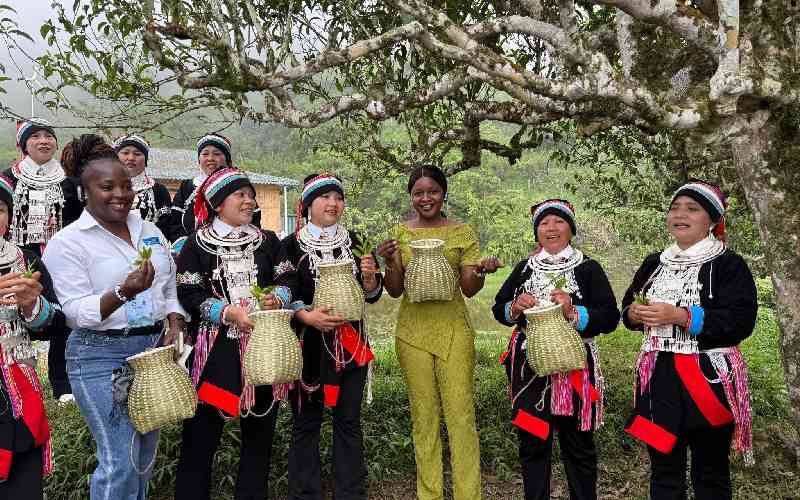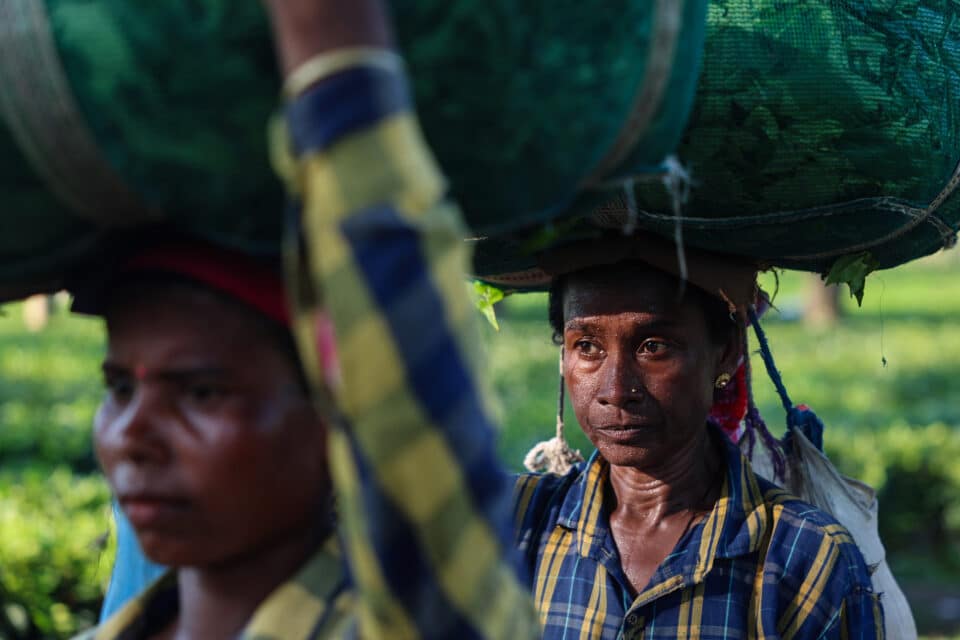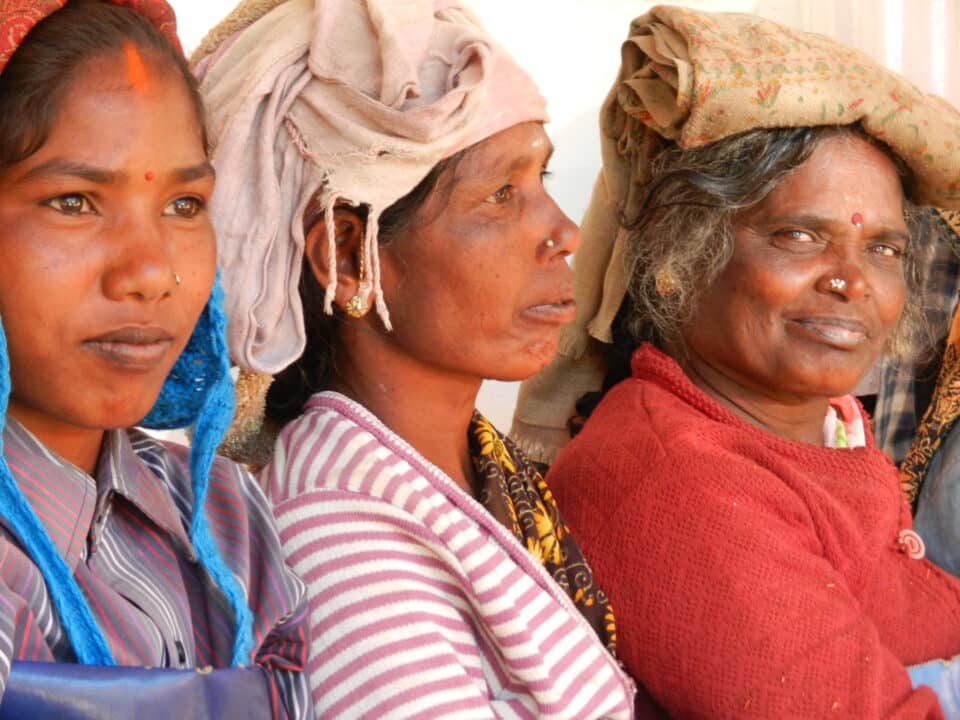This month’s News Update brings a continuation of reports of labour unrest and the negative impacts of the climate crisis on the tea industry and its workers and farmers. They are also experiencing the impacts of international relations as Kenya seeks to overturn bans on its tea exports to Sudan and Iran, and US tariffs hit multiple tea producing countries. But amid the struggles, there are pockets of more positive news; cross-country and cross-organisation partnerships to find climate solutions, the signing of a ‘Fair Pay Charter’, the harnessing of technology to improve transparency and raise incomes, and actions to protect workers from wild animal attacks are some examples. Yet overall, THIRST reiterates the need for industry-level action to tackle the root causes of the issues plaguing tea workers and farmers – causes that go beyond their immediate employers and much further up the tea value chain.
Climate crisis conflicts & solutions
Reports continue of tea production being under threat from climate change in various regions, and of measures being tacken to tackle or mitigate the threat. In India, for example, the Tea Board has introduced adaptive measures like drought-tolerant cultivars, organic farming, and better water management to support Darjeeling’s tea gardens (News Mobile, 02/04/2025).
Meanwhile, tea farmers in Kenya are adopting climate-smart farming methods taught by Chinese experts to cut carbon emissions. The initiative, part of a trilateral cooperation project involving partners from the Global North and South, will continue until 2026 and aims to strengthen sustainable tea farming (China Global South Project, 04/05/2025). In addition, a global FAO-led initiative is helping tea farmers cut carbon emissions and adapt to climate threats that could affect 30% of tea-growing areas by 2050 (The Star, 28/04/2025).
Bangladesh’s tea industry is grappling with a severe crisis driven by prolonged heatwaves and drought, particularly in Moulvibazar, threatening jobs and wages. Many workers, already facing harsh conditions and low pay, urgently need compensation, tools, and training to navigate the challenges (The Daily Star, 04/05/2025). This is leading to conflicts such as the controversy surrounding the Halda Valley Tea Estate, accused of diverting the Baromasia canal, allegedly harming local rice farming; the estate denies any wrongdoing (The Daily Star, 03/04/2025).
Impact of US tariffs on tea producers
U.S. tariffs have disrupted the global tea trade, raising costs on imports from key producers like China, India, and Sri Lanka. This has introduced volatility in supply, pricing, and product availability, especially for smaller tea businesses (Market US, 23/04/2025). However, Kenya now holds a competitive edge in the U.S. market, as its exports face only a 10% tariff—far lower than many rivals—positioning its tea more favorably (Eastleigh Voice, 10/04/2025). Meanwhile, Japan’s tea industry is under pressure. Shizuoka Prefecture, a major exporter of green tea, has been hit by tariffs affecting 30% of its volume and 40% of its export value to the U.S., though confidence in the appeal of premium Japanese tea remains strong (Mainichi, 25/04/2025). At the same time, the global matcha market, driven by surging demand, faces severe shortages. Japanese producers have imposed purchase limits, and with a 24% U.S. tariff on Japanese imports, matcha is expected to become increasingly scarce and expensive (34th Street, 24/04/2025)
Tea farmers & workers impacted by Kenya-M.East diplomatic clashes
Kenya’s tea industry has been rocked by a diplomatic fallout with Sudan, following a ban on Kenyan tea imports by the Sudanese government. Although Kenya’s Head of State initially announced on 1 April 2025 that Sudan had reversed the ban (Kenyans.co.ke, 01/04/2025), Sudan’s military later denied any such reversal, stating no Kenyan products had entered the country (Standard Media, 02/04/2025). While some commentators downplayed the impact, noting Sudan might source Kenyan tea through alternative routes, Mombasa’s vital value-addition tea industry—employing over 1,000 people—faces significant disruption (Standard Media, 03/04/2025). Farmers in Embu County warn of financial collapse, urging urgent government intervention (NTV Kenya, 08/04/2025).
In 2023, a Ksh542 billion tea-related graft scandal in Iran implicated Kenyan exports and severely strained bilateral relations. The scandal, involving Iranian officials and unjustified budget inflation for tea imports, led to a trade ban that significantly hurt Kenya’s economy (Kenyans.co.ke, 17/04/2025). In response, Kenya is now actively pursuing the lifting of the ban to regain access to the lucrative Iranian market. Agriculture Cabinet Secretary Mutahi Kagwe emphasized Iran’s importance for premium Kenyan tea and highlighted the government’s commitment to revitalizing the tea value chain through renewed trade ties across the Middle East and Central Asia, [saying] “Reopening access to Iran’s robust market could be a game changer for tea farmers and the entire tea value chain.” (KBC, 17/04/2025).
“All we ask is to let us live with dignity” former worker on closed plantation
When a tea plantation closes, the impact on its workers go far beyond losing a job. A John Kennedy a former worker on the Manjolai estate in South India that was closed in order to revert the land to forests exlpained: “The fact remains that we have lost our livelihood and are being uprooted and made to adapt to a place which is entirely different from the habitat in which we were born and raised. Every part of our lifestyle will change, including the weather in which we lived, the type of clothes we wore, the food we ate, etc. All we ask is to let us live with dignity,” The few workers who remain on the plantation have urged the state not to evict them until the Supreme Court resolves their rehabilitation plea, alleging that they are being coerced to leave. (The New Indian Express, 27/04/2025)
We are used to seeing stories of esate closures in these updates, but this month there are also stories of some reopenings. In Darjeeling, operations at the Sungma and Turzum Tea Estate resumed after a settlement between management and unions resolved a plucking dispute (Millennium Post, 28/03/2025). After two decades, the Dheklapara Tea Garden in Madarihat reopened, promising phased employment for over 600 workers and renewed hope for local families. Rakhi Munda, a garden worker, said: “After so long, I’m finally working in my own garden. We used to survive doing odd jobs elsewhere. Now I can work here again. We’re truly happy.” (Millennium Post, 24/04/2025). It is to be hoped that Rakhi Munda’s new employers will be able to sustain her regular wage at a level that is sufficient to cover her daily needs – saving her from having to scrape together a living from odd jobs.
E Africa ramping up its tea game
East African tea producing countries are ramping up their game to compete for international markets an ensure better returns for farmers.
Tanzania is taking steps to reform its tea industry, with Agriculture Minister Hussein Bashe directing the Tanzania Tea Board (TTB) to establish a transparent business system within 14 days, ensuring accountability between farmers and factories (The Guardian, 08/04/2025). Further, the government has mandated a detailed cost analysis of green tea production to address pricing concerns, following claims that the current rate of 360 Tanzanian shillings per kilogram is excessive (Big News Network, 10/04/2025). The measures aim to improve transparency and sustainability across the tea sector.
Kenya is also rolling out key reforms to strengthen its tea industry. The government has removed taxes on tea packaging materials to enhance value addition, boost productivity, and raise farmers’ incomes (Citizen Digital, 07/05/2025). Additionally, all 142 tea factories in the country will soon be allowed to sell directly to international buyers, bypassing intermediaries. This move, announced by Agriculture Cabinet Secretary Mutahi Kagwe during International Tea Day celebrations, is part of a broader strategy to improve the industry’s sustainability and global competitiveness (Kilimo News, 05/05/2025).
Kenyan tea farmers have attended a tea festival in China’s mountainous Yunnan province offering insights into development strategies that seek to boost the livelihoods of smallholder tea farmers… The festival is highlighting the success of cooperative farming models, a strong emphasis on accessing broader markets, and the economic benefits of value-added processing in the local tea industry… The county’s effective support system for its 30,000 tea farmers (including tunnels carved through mountain ranges to improve access) is being presented as a tangible model for adaptation in other countries such as Kenya. (Standard Media, 07/05/2025) (see image).
Meanwhile, Ugandan tea farmers are abandoning their crops as farm-gate prices fell from Shs700 to Shs100 in the first six months of 2024… During a visit to southwestern Uganda last year, President Museveni warned farmers against gowing tea due to challenges of low returns for small-scale farming, telling them that tea was only profitable on a large scale. The low returns in the tea sector, which have persisted for more than a year, have prompted government to rethink bailing out struggling producers, especially smallholder farmers who have been pushing for subsidised fertiliser costs of more than 50 percent. Monitor 16/04/2025
Reducing human-animal conflict
Our news updates often report on fatal incidents involving tea workers and their children and wild animals. But this month there is slightly better news.
In Nepal’s Bahundangi village, near the Indian border, farmers have successfully reduced human-elephant conflict by switching from rice and maize to tea and lemon crops, which are less attractive to wild Asian elephants. Combined with improved compensation policies and shifting community attitudes, the area has seen no elephant-related human fatalities since 2015 (Mongabay, 03/04/2025). Meanwhile, in India’s Jalpaiguri district, three leopards were captured from tea estates, easing fears among local residents. The animals had been threatening livestock, prompting foresters to set traps after sightings at Ambari tea estate (Telegraph India ,27/04/2025).
Labour grievances intensify across S Asia amid mixed economic picture
Tea worker protests and labour grievances continue to intensify across South Asia, underscoring long-standing structural issues related to wages, land rights, and Provident Fund (PF) irregularities. While protests often target local estate management, industry observers note that deeper causes—such as supply chain imbalances and regulatory gaps—lie further up the value chain.
In Bangladesh, Sylhet has seen some of the most severe unrest. Around 2,500 workers from Kalagul and Burjan Tea Gardens blocked the Sylhet Airport Road and Highway on May 4 after enduring over 20 weeks without pay or food allowances. Workers described hunger, despair, and broken promises (The Daily Star, 01/05/2025; New Age, 06/05/2025). Earlier, 470 families at Kalagul faced similar hardship due to unpaid wages and denied Eid bonuses (The Daily Star, 31/03/2025). In Moulvibazar, union leaders decried delayed wages, rations, and bonuses across multiple estates (New Age, 08/04/2025). On May 8, Burjan workers agreed to resume work after being promised partial payment and rations (The Daily Star, 08/05/2025).
In India, West Bengal has been a hotspot for Provident Fund (PF)-related agitation. The Trinamool Cha Bagan Sramik Union (TCBSU) led protests at the Jalpaiguri PF office and announced a broader campaign covering 150 gardens (Millennium Post, 08/04/2025). This was followed by a protest in Siliguri demanding legal enforcement and PF compliance from garden owners (The Statesman, 06/05/2025). Workers at Andrew Yule & Co.-owned estates in West Bengal and Assam also protested poor wages, lack of school transport, and non-deposit of PF contributions, calling out state inaction (Telegraph India, 30/03/2025; 12/04/2025). In Assam’s Chikoni Tea Estate, workers blocked a highway on April 22 after being ignored by management over wage delays (India Today NE, 22/04/2025). Broader demands in Assam also include wage increases, land security, Scheduled Tribe status, and improved living conditions (India Today NE 02/04/2025 & Times of India, 02/04/2025).
In Sri Lanka, the Ceylon Workers Red Flag Union protested against the informalisation of labour in the plantation sector, a growing concern among tea workers (Daily Mirror, 01/04/2025
Despite the turmoil, the economic picture is mixed. The chairman of the Barak Valley Branch of the Tea Association of India cited challenges from absenteeism, manpower shortages, and financial constraints as pressures on productivity (Economic Times,29/03/2025). Yet, the Guwahati Tea Auction Centre (GTAC) reported record-breaking performance in 2024–25, driven by improved quality, favorable markets, and global demand for premium Assam Tea (Borok Times, 22/04/2025).
Amidst these complex conditions, a rare positive signal came from the corporate world as Mark Clayton of C2W Group became the first British business leader in Asia to sign the Fair Pay Charter, committing to ethical employment standards in the region (CBS4, 28/03/2025).
Efforts to promote equity, innovation, and sustainability
As THIRST’s research has shown, the root causes of the problems that workers and farmers are protesting against are deeply ingrained throughout the tea value chain, and will only be resolved if they are tackled at an industry level. However, some reports have emerged this month of efforts to promote equity, innovation, and sustainability in the global tea sector through partnerships, judicial interventions, and grassroots initiatives.
In Sri Lanka, Russell’s Tea (Pvt) Ltd signed a Memorandum of Understanding to allocate 4% of its international sales from its herbal tea brand toward the sustainable development of the country’s indigenous communities—marking a significant corporate social responsibility milestone (The Island, 31/03/2025).
In India, the Darjeeling region is seeing renewed hope through the “Supplemental Income for Tea Estate Workers” initiative. Led by the Darjeeling Welfare Society in collaboration with the Gates Foundation and Grant Thornton Bharat, the programme offers vocational training, enterprise creation, and market linkages to revive nearly half of Darjeeling’s closed tea gardens (Tirapur Times, 14/04/2025). Complementing this, a separate initiative in Jalpaiguri aims to empower small tea growers by distributing solar-powered rickshaw vans to vendors who now serve tea from “bought-leaf factories.” The project—backed by Solidaridad—plans to expand to 500 vans across major tea-producing regions (Millennium Post, 15/04/2025).
The Supreme Court of India directed the governments of Tamil Nadu, Kerala, and Assam to release Rs. 20 lakh—earmarked as remuneration for retired Supreme Court judge Justice AM Sapre— in compensation to widows of deceased tea estate workers suffering extreme financial distress due to unpaid dues—a landmark recognition of long-standing worker grievances (Law Trend, 24/04/2025).
In Kenya, the Ministry of Education and Lipton Teas and Infusions have launched a Tea Academy at the University of Kabianga in Kericho County. The academy will focus on climate-smart farming, research, and skills development in collaboration with Ekaterra Global Operations, the corporate entity behind Lipton (KBC, 05/05/2025).
Globally, UK supermarket giant Sainsbury’s is returning to Fairtrade certification for its own-brand black tea, including Red Label. This move is expected to generate over £1 million ($1.34 million) annually in Fairtrade Premiums for farmers and workers… (MSN, 06/05/2025).
Replacing ageing workforce with migrant labour raises human rights risks
Labour shortages are a common problem across many tea producing regions. Mechanisation (see below) is one way that employers have been responding. Employing migrant labour is another, as described in The Telegraph last month.
The educated younger generations [in Darjeeling] are unwilling to work as labourers and are looking for green pastures away from the garden… “the average worker’s age has jumped from 38 to 47…” An ageing workforce has hit productivity…migrant workers are brought over by labour contractors. “We do not pay daily wages, provident fund or other statutory benefits. A lump sum is agreed upon and they work for extended periods of time to complete the task,” [an] official said. However, finding a large number of such workers willing to work in the cold mountainous terrain is also not an easy task. (The Telegraph, 06/04/2025)
While employing migrant workers may solve the plantations’ workforce problem in the short-term, they (and the companies that buy their tea) should be aware of the serious human rights risks involved in doing so. The employment terms described here fall far short of international human rights standards and ILO conventions, and are likely to breach mandatory human rights due diligence requirements too.
Technology in tea raises moral questions
While much of the tea industry continues to adhere to colonial-era norms and practices, other pockets are embracing new technology and exploring how to harness its power to improve the tea sector. For example, Assam (India) is set to implement a blockchain and AI-powered auction system to enhance transparency and streamline operations within the tea industry and promote fair pricing practices. (Coin Geek, 12/04/2025)
The adoption of tea-plucking machines is accelerating in Kenya, particularly among smallholder farmers seeking to cut labour costs and boost earnings. Michael Cherutich of Temec, a KTDA subsidiary, notes that mechanisation has become a financial lifeline for farmers burdened by the high cost of manual pluckers (The Star, 09/04/2025). However, the shift has had a human toll. In Bomet County and beyond, casual labourers like Jane Chepkemoi face job loss and growing uncertainty. Despite years of hard, low-paid work, many are now displaced by machines, raising concerns about the social cost of efficiency in Kenya’s tea sector (Citizen Digital, 16/04/2025).
Meanwhile, China is investing in advanced mechanisation at the harvesting level with a humanoid robot [that] combines vision-language models with specialized expert systems to handle complex, unstructured tasks that traditional industrial robots cannot manage. The Chinese government has designated “embodied intelligence” as an industry of the future that it intends to cultivate. (Xinhua, 16/04/2025).
Tea harvesting machines have become a common sight in many parts of the world, but the idea of a humanoid robot “hand” plucking tea raises moral and philosophical questions about how the women who have plucked tea for centuries have traditionally been viewed by the industry. And if they are to be replaced by robots or more traditional harvesting machines, what provisions are being made for them to be able to earn a living elsewhere?
Sustainability and diversification in South Asia’s tea sector
In Assam, tea gardens are now eligible for financial support under India’s National Mission on Edible Oils–Oil Palm (NMEO-OP), following appeals by the North Eastern Tea Association. The scheme allows cultivation of oil palm and other high-value crops like agarwood on up to 15% of tea estate land. This move, already mirrored by West Bengal, aims to provide relief to tea planters through planting incentives, irrigation support, and intercropping subsidies (The Statesman, 03/04/2025). The Assam agriculture department convened tea industry stakeholders on April 10 to develop regulatory frameworks for implementing the scheme across 18 districts (Telegraph India, 09/04/2025).
Meanwhile, in South India, tea growers are experimenting with intercropping fruit and medicinal plants amid falling prices, high input costs, and climate-driven yield crops. While some smallholders remain wary, experts advocate policy reform and long-term demographic realignment to reduce dependence on fluctuating tea prices and ensure sustainability (Mongabay, 22/04/2025)
Share this update
Sign up for our monthly newsletter to stay in the know about human rights in the tea sector
Each issue of our newsletter includes:
A summary of the latest tea sector news
Upcoming THIRST events
THIRST news and updates
New reports and resources from our Knowledge Hub




